#its that thing of like people who are fundamentally opposites in the same way
Explore tagged Tumblr posts
Text
little thieves is so good yall
#crunchyposts#books#reading commentary#im like 70 ish percent through the audiobook#i had to force myself to stop bc i just wanted to keep reading#good writing really really good writing#i can appreciate good writing more now that i actually write lol#i can point out like oh i know the author meant this as a double entendre and im like oh this vibe is what im going for in the scene#i wrote last week and oh im absolutely stealing that for my fic#etc etc i love books i love stories god#yeah highly recommend this book#wow who knew that. writing fic would be the omen that my mental health was spiraling up#ANYWAYS ENOUGH ABOUT MY FIC. the romance is incredibly well written i am screaming a lot#its that thing of like people who are fundamentally opposites in the same way#also theyre incredibly competent but reduced to absolute losers in each others presence its great
0 notes
Note
oh i would actually be curious to hear your thoughts on lolita book covers in that case. i do get the sense that some of the covers are designed to uncritically titilate and seem to misunderstand the text, but that could obviously be an assumption on my part lol.
oh i agree that the cover designs tend to run counter to nabokov's intentions, both in the text and in the literal instructions he gave about covers lol. they pretty clearly rely on putting some young girl on display, which is exactly what nabokov did not want to do visually; they also tend to suggest dolores as some kind of seductress (sultry gazes, pouty lips, &c). clearly this is precisely the opposite of what the text tells us about her.
however when evaluating these visual choices i find that many people portray them as some kind of originary and culturally polluting act: that is, a narrative emerges that the problem here is people misinterpreting 'lolita', and then publishing it with covers that will do harm to young girls &c. i think this is lazy analysis and fundamentally makes idealist assumptions overestimating the effect of cultural products (books, book covers) on problems, like the sexualisation of children, that are in fact grounded in material relations, such as in this case the status of children as legal property and the total power granted to adults over them. that is to say, these broader conditions are at root the reason that cultural products like the cover of 'lolita' look the way they do, and chalking it up to individuals not understanding the book is never going to get us very far; and also, although some of these covers are pretty egregious, they are the reflection rather than the cause of the sexualisation of children, a problem that would continue to exist even if every edition of 'lolita' ever printed just said "humbert humbert is an unreliable narrator and dolores haze is a child he is preying on" on the cover.
fundamentally i also think this sort of conversation often elides some more interesting points about whom these covers communicate to and what they say. you suggest they are meant to "titillate"; although i would agree dolores is often shown as sexual, desirable, and seductive, i'm not sure that's the same as assuming the cover is trying to arouse the potential reader. for one thing, to put it bluntly, this style of cover tends to be associated more with books marketed to women than to heterosexual men. and more broadly, and this is something the lolita podcast really fails to understand imo, the phenomenon of people reading 'lolita' and relating themselves to dolores is not mutually exclusive with this type of rhetorical construction of dolores-through-humbert's-eyes. that is, often what appeals about dolores is, i think, precisely the fact that through her, people find a way of discoursing about or simply re-enacting the kind of sexualisation that they are already subjected to or have been in the past, whether or not at a level as explicit and extreme as what nabokov depicts.
i'm not really interested in a simple moral condemnation of the people who design these covers; that critique writes itself. they are obviously bad and facile, and reflective of precisely the culture of child sexual abuse that nabokov's text condemns. but if we are interested in the reception of these objects, or interrogating the cultural meaning and implications of their existence, i just think there's a lot more going on here than what the podcast portrays as a simple sort of 'broadcast' model of mass media wherein the 'lolita' book cover and trope is beamed out to unsuspecting innocents who are then exposed to its nefarious elements. dolores appeals to people for lots of reasons, some prurient, some pitying, some openly self-projective, and these are not mutually exclusive with one another nor are they mutually exclusive with readings that reproduce elements of the very lolita character that humbert creates and uses to silence and re-write dolores. we can be uncomfortable with that and refuse to talk about it but if that's the position someone wants to take then i'm not likely to be interested enough in their opinions to, like, listen to their podcast about this book lol.
428 notes
·
View notes
Text
This has probably been talked about before, but I love how Cold doesn't represent logic.
Normally, when you see a cold, uncaring sort of character in media, someone who just doesn't care, they're associated with logic or power. The stoic detective, the ice queen, the snarky assistant, you know the deal.
But not The Voice of the Cold. You want a logical character? That's Skeptic! But Skeptic isn't cold by any means: he's, well, skeptical, of the things that people tell him. He has the goal of finding out as much information as possible about this situation, and getting out of the hostage situation the Narrator has set up. He's not super expressive or anything, but he's actually pretty approachable/friendly with anyone not named 'The 'Narrator'.
And it makes sense. Skeptic is the voice you get by taking the most logical course of action. Take the blade just in case, but hear the Princess out and ultimately realize she's as much of a victim in this as you are before freeing her, and doubling down when the Narrator tries to control you.
Cold, on the other hand, is about apathy. The closest things to a 'goal' he has are:
1. Don't be bored.
2. Get revenge on the Narrator somehow.
And so, he really can't be logical, at least, not 'logical' in the way we perceive it. Our goal is to get out as unharmed as possible, and many of his suggestions directly contradict this goal.
But the Cold doesn't care about death. After all, it's already been established it's already temporary. His sheer apathy towards any and all harm that comes towards him fundamentally contradicts conventional logic, because conventional logic dictates taking the course of action that minimizes harm.
Now, that's not to say Cold doesn't care about anything. In his own way, he genuinely is trying to look out for the other voices when he urges them to numb themselves to pain, because it's easier that way, isn't it? He's clearly frustrated when they can't do that, urging the Player to just ignore them and listen to him instead during Moment of Clarity.
But at the same time, because of Cold's apathy, his typical 'logic' is just "whatever seems interesting". He's fundamentally a very impulsive character, not in spite of his apathy, but because of it.
Honestly... It's more like Contrarian than anything. I mean, think about it. An impulsive character who does whatever seems interesting and strives to make the Narrator as miserable as they can? The difference is in how that apathy presents itself, which makes sense, because they pretty much manifested in opposite ways.
That aside, though... The Cold acts based on a bestie to feel. Specifically, a desire to feel entertained. And, it makes sense, considering he's what you get from killing yourself due to agonizing numbness and boredom. Of course he's going to be apathetic, uncaring of his wellbeing, and impulsive. That's what you manifested.
Apathy, taken to its logical conclusion, is very impulsive. And I love just how well Cold represents that.
#stp cold#stp skeptic#stp contrarian#there were a lot of tangents that i wanted to go on but ultimately couldn't because i couldn't logically tie them back to my point#godd the cold contrarian parallels#and even the cold-prisoner parallels#or just how directly the voices reflect your actions#(ie contrarian being much more kind when you get him through trying to snark the narrator vs traumatizing the adversary for the heck of it)#i must yap about the little disembodied voices#voice of the cold#slay the princess
170 notes
·
View notes
Text
Imagine looking at a character whose entire premise is that in every stage of his life, he's made every version of himself into someone that inspires people to such a degree that EVERY SINGLE VERSION OF HIM has people wanting to literally follow in his footsteps in some way or another.....
And coming to the conclusion that like.....the most important things about him are the sum of all his trappings. His entirely homemade developed from scratch could not exist if not for what he already was and brought with him BEFORE crafting this newest version of himself trappings, with his greatest trait throughout all of it being his adaptability; his ability and willingness to roll with the punches and not try to simply weather any opposition or changes to his life but instead reshape himself as needed to better fit INTO whatever new shape his life and the world around him takes. All while managing to carry the most innate, fundamental and necessary aspects of himself from one version to the next. Thus every single version of himself is different but simultaneously every single version of himself is also undeniably the same person.
The strength of this character, to me, will always be that he can be so many versions of himself, he can become so many things, all without ever actually losing or discarding any of the aspects of himself he considers most essential, the things he's not willing to lose or give up just to keep going. Finding that road not taken by most, usually because most never even think to look for it as an option. But one that he's always able to find because the one trick he's mastered in his tumultuous life is threading that needle of not just digging in his heels in an unproductive way but rather being selective about when and where he makes a stand and decides "this is not a thing I'm willing to compromise about" but here are places and ways I can and will change and evolve and adapt in order to make it possible for me to hold onto these parts and keep them as they are.
And that's why its always so mind-boggling to me that so many writers can't seem to think of anything else to do with Dick Grayson other than invent some new reason for him to just....not be that person, or to like just take the character whose most basic fundamental trait he's NOT about to compromise on is willingly giving up his spot in the driver's seat of his own life.....and make him just a passenger in his own life and stories.
Dick Grayson at age nine....at age nineteen...at age twenty nine....the one core thread running through all versions of him is the only way he's standing back and letting you call the shots for him or putting him on the sidelines in some way is over his dead body.
HOW he goes about that, what that looks like, who he becomes and what aspects of himself he plays up at some times and what traits he lets fall by the wayside at other times when they offer less in service to his primary goal here....that changes constantly. He changes constantly.
But those changes are almost always (or at least they used to be/should be IN MY OPINION) made with the intention of keeping certain things about him or his life as consistent as possible.
That's the duality of Dick Grayson that I'm here for. The inherent contradiction of him that COULD allow for endless conflict and breaking new narrative ground in all sorts of ways if mined properly:
His eternal willingness to compromise....but only ever in pursuit of doubling down on the ways he's not willing to compromise.
Forever walking that tightrope in ways that only a kid born and raised in a circus could ever hope to.
#see also: my grinding teeth when people disparage his circus origins#like the only thing its good for is colorful backstory and explaining his acrobatics#THERES. SO. MUCH. THERE.#theres so much EVERYWHERE in every aspect of his backstory and his preexisting comics and yet over and over we get#....what if we just ignored all that and did what the fuck ever as though this character has nothing integral to him or fundamental to say#to be fair my gripes with Taylor are not exactly interchangeable with my gripes with the previous runs#but I lump him in as an extension of them because while evocative of different SIDES of my ennui with these takes on Dick.....#the thing about Taylor's stuff to me (or the parts I read at least) is that its generic as hell while only retaining superficial elements#of Dick's character and stories in order to point to them and say see these are definitely about Dick Grayson. like....only in very surface#level ways. underneath that theyre basically generic superhero adventures that could easily be retooled to be about a pretty sizable number#of other characters. tbh with the whole alfred inheritance thing it honestly felt from the get go#that Taylor was more interested in writing a kinder gentler Batman like a Bruce from one of the animated shows like#The Brave and the Bold who gets along better with everyone else. even the way the Brave and the Bold largely exists to use Batman's#popularity as a star vehicle to platform his co-superhero for the episode lends itself to Taylor's approach in his NW run#with the central figure - only nominally DG imo - basically existing as a platform allowing for the drafting of any other character he want#to write in any given arc or story in a similar way to how Bruce is utilized in Brave and the Bold#anyway. idk idk. my issues with Taylor are not the same as the others exactly but also they are and also I just plain dont like the guy#so I complain about him at any given opportunity even when its not technically as accurate or relevant as it possibly could be#I Am Flawed. its fine though dont worry about it. its called being nuanced
165 notes
·
View notes
Note
Hi, I just finished the AA trilogy with my bf and we fell in love with it! I found your blog the other day, and it sometimes feels like you're the only one giving correct takes on these characters' writing and the minutiae of everyone's inner worlds (or the fumbling of, see Godot).
I just got here, but, something that's been bothering me about the fandom's approach to the sequel trilogy is like... the imperialist undertones are glossed over, or swept under the rug. Researching "The Dark Age of the Law" and beyond puts a sour taste in my mouth. And with Khura'in the country vs Kurain the village? It all feels racist at best (the concept of the Divination Seance gives me squick). If you have the time, I'd love to hear your thoughts about AA5 and AA6 in relation to the world of AA as a whole. Thanks again for all of your thoughtful and nuanced takes on this series!
so glad to hear you guys liked the games!! thank you for enjoying my posts, i always appreciate it.
the tl;dr of it is that i do think they are genuinely bad enough additions to the franchise that they have signed mainline ace attorney's death warrant. picking out the dark age of the law stuff and aa5 and the imperialism in aa6 you've pretty much honed right in on my two biggest critiques
however i do want to say that although they're being bundled and sold as a 'second trilogy' that's not quite accurate either experientially when playing the games or from a development perspective. aa4 had scenario design/creative direction by series creator shu takumi, with the art director being kazuya nuri (responsible for character design for rise from the ashes in the series previous to this); aa5+6 was spearheaded by takeshi yamazaki, who had been with the franchise since its first game, with the slightly less tenured takuro fuse on art direction/character design. yamazaki and fuse are not without skill, but i think they're both significantly less skilled than takumi and nuri respectively and. it really shows.
pair that with the fact that aa5 and 6 fundamentally do not follow up on any of ace attorney 4's established characters or plots more than superficially, i don't think it's particularly useful to critique 4-5-6 as if they're a single body of work in the same way the trilogy is. apollo justice isn't a perfect* ace attorney game but it's a good one.
anyway i think buying into the 'dark age of the law' stuff in ace attorney 5 necessitates cheapening all of the events preceding it. the implication that 1. the law wasn't that bad before but it Is Now and 2. a single case was the tipping point for whether or not the entire legal system would be bad just ruins the times when ace attorney has managed to acknowledge corrupt systems as a massive source of problem for the everyman in the past
i think this screenshot from the dark age of the law wiki page says a lot:
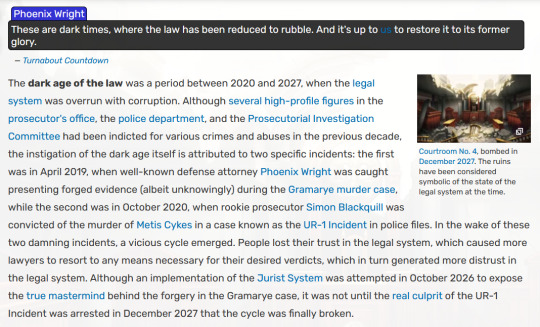
For starters, that phoenix quote. He would not fucking say that. I don't think there has ever been a point during or leading up to phoenix's career where he thought the legal system had 'glory' he would then want to restore it to. you seem to get it so im not gonna harp on this too much on this but. jesus christ
then, then there's fact that even by stating the most basic details about the franchise's events undermines the whole premise. like okay notice that the corruption that happens during the trilogy/investigations spinoffs is coming from all of the actual agencies that represent law and order/the system: the prosecutors, the police, and the prosecutorial investigation committee. however in aa5 the thing they choose to paint as responsible for supposedly unprecedented levels of corruption in the legal system is defense attorneys resorting to more drastic means, and the general public; aka not the people who are responsible for upholding the legal system but the people who are victimized by it and in opposition to it.
i don't think this was an intentional choice as much as it's just sloppy, inconsiderate, and contrived writing.
aa6 is just flat out racist. 'imperalist undertones' is i would say the gentlest way you could phrase it. like. japanese characters going to a made up south asian country that needs to be taught how to govern itself to quash its internal rebellion is like. so high on the yikes meter.
making a bunch of fake 'ethnic sounding' nonsense names filled with apostrophes to make them into silly sounding english phrasing was a disastrously tone deaf thing for the localization to do. they're really unforgivable. the worst of it all is probably "Inga Karkhuul Haw'kohd Dis'nahm Bi'ahni Lawga Ormo Pohmpus Da'nit Ar'edi Iz Khura'in III" i'm unsure if the names are quite as offensive in the original japanese because i haven't looked too much into what they actually are and have a really limited knowledge of the language. but. this name in japanese is "インガ・カルクール・ククルーラ・ラルバン・ギジール・ホフダラン・マダラ・ヴィラ・ヤシマ・ジャクティエール・クライン3世" which is written in katakana. katakana is, in contrast to kanji and hiragana which are used for writing japanese, used to phoenetically transcribe foreign languages or to write loan words. so the foreign-ness of this character is being emphasized here in the original text as well.
the supposed cultural inferiority of the khurainese people is baked into the game at pretty much every level, down to the gags. khura'in has the 'plumed punisher' show, which is actively criticized by the characters in game for just being a cheap ripoff of the steel samurai. they don't even get to have their own tv.
i believe the reason the racism is pretty much glossed over a lot in the fandom is for several reasons. for starters, ace attorney fans overall tend to fall into three camps: 1. people like me who fucking hate these games, refuse to acknowledge them, and would retcon them out of existence if possible. 2. people who have found things they like about the game and have a Good Version of the characters and plots that they have constructed in their head and 3. people who view all of the hate on these games as completely overblown
the first camp Does talk about how the game is racist but we're all already in agreement about that so it's kind of preaching to the choir and a bit redundant to keep going on about. the second camp tends to acknowledge the stickier aspects of the game but focuses on making content around the elements they like rather than critique. the third camp is the type to throw the baby out with the bathwater re: critiquing a thing they like. it's all haterism to them. but either way i think its kind of fucked up how many people will be like 'aa6 isnt that bad you guys are just mean' without even acknowledging these complaints.
anyway the khura'in country vs kurain village thing is really weird to me it shows both a lack of imagination and a disregard for the series' own established lore. why would a girl from a village where almost everyone is a spirit medium need to go to a place where only, like, two people are mediums to train.
i will say though that the divination seance is kind of one of the only things i found about aa6 to be an interesting addition. for a franchise with ghost summoning and murder solving, the two have a kind of hilariously low amount of overlap so i found the idea of bringing ghost bullshit into court really fun. mechanically speaking, the divination seances also felt a LOT better to play than the mood matrix segments of aa5.
in general, i think the biggest weakness of the mainline franchise under takeshi yamazaki's stewardship is its misunderstanding of stakes. both aa5 and 6 prioritize more bombastic and impressive on paper material stakes. oh no! the ENTIRE JUSTICE SYSTEM BEING GOOD OR BAD depends on this one case! on no! we have to DEAL WITH REBEL INSURGENTS! complete horseshit when there is not competent and functional enough character writing to get us emotionally invested here. yamazaki seems to think bigger is better, and that just simply isnt true for something like ace attorney
i've pointed this out in the past when critiquing aa5 and 6 but if you look at the actual material stakes on the line in ace attorney, they're at their highest after rise from the ashes. ousting the corrupt chief of police is the most impressive and impactful thing phoenix does with his career (arguably until the jurist system, but definitely in the trilogy.) but that's not the big Finale case for his character arc. his finale case is defending his college girlfriend; a nun who lives in the mountains, whose conviction would have had zero implications on the larger fabric of ace attorney's legal system. because takumi's writing clearly shows that he understands what makes a plot impactful is the emotional stakes the characters have invested in the events.
before taking over the main franchise, takeshi yamazaki was responsible for the miles edgeworth investigations spinoffs. i do enjoy both of those games - aai2 in particular is really strong. yamazaki does a great job with edgeworth's character arc even if i have some specific gripes with the duologys writing. i think theyre solid additions to the franchise. but you can see traces of this sort of misalignment in narrative priorities here as well. for example, the last case in aai1 is notorious for still going on for, like, an entire hour or two past the time when the last remaining plot point we care about has been revealed. because yamazaki seemingly had no understanding that That was the thing the case should have been about, and that should have been the final mic drop of the game. it just keeps going! he didn't know the game was done and he added a bunch more bullshit busywork after it that no one likes!
so yeah. without going into anything even as specific as how individual plotlines or character arcs were mishandled in aa5/6 that's really my overview What Went Wrong of those games.
#i genuinely might need to put my opinion on aa5 and 6 in my faq at this point#not because i mind getting a chance to talk about how much i hate these games. but just for due diligence#ace attorney#*there are two perfect ace attorney games: aa1 and plvspwaa#this got so long im so so sorry.#i think ill just hotlink this post in my faq because it hits most of my talking points about these games
281 notes
·
View notes
Text
Season 1 has its writing issues, but it accomplished some major character work with Rhaenyra. It took her across a moral threshold and changed some core components of how she relates to others. She begins the season paralleled with Helaena. But she ends the season paralleled with Aemond and Daemon. IMO, the Red Sowing was a major moral Rubicon crossed - and she's changed in permanent, fundamental ways. That was the goal of this season. Partly the reaction to the season is due to how this kind of internal character work isn't usually the focus of Fantasy; it's more common in "realistic" dramas.
First, the comparisons with Helaena. They mourn their sons in visually similar ways, clutching an item of clothing/blanket of the child's.
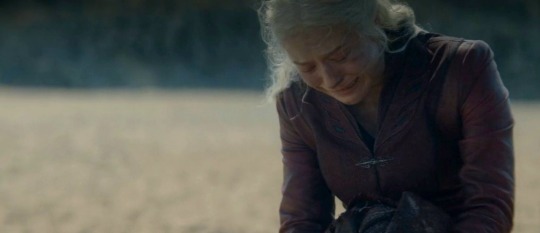
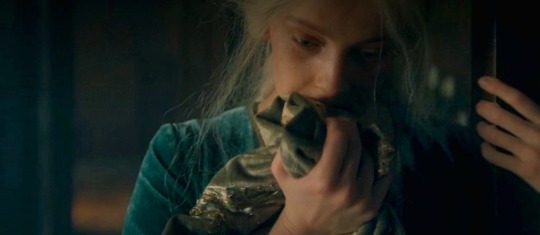
Then Rhaenyra repudiates the idea that she wanted Jaehaerys' head, specifically by mentioning this similarity and empathy with her little sister:
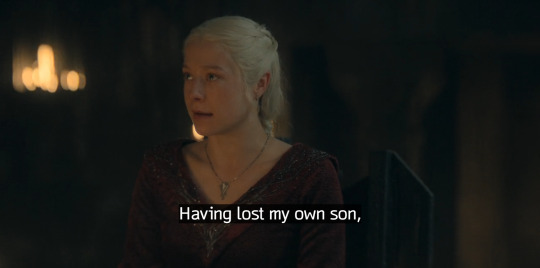
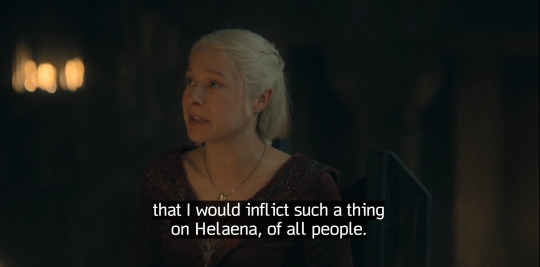
It's after this scene that she confronts Daemon and rejects his "a son for a son" logic. Then we get the final visual parallel. Both sisters look up and see (in flower petals and dust) the ash that will rain down on the kingdom due to the destruction of a dragon fire war. They're both disturbed by it. Early in the season, Rhaenyra tried to do all she could to prevent that future. By the end of the season, though, she has wholly embraced it.
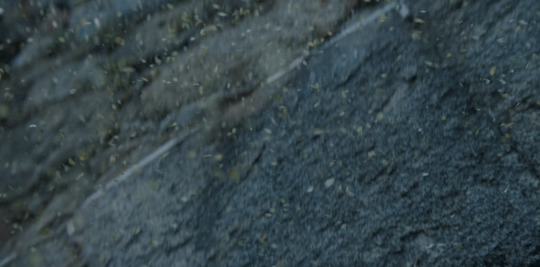
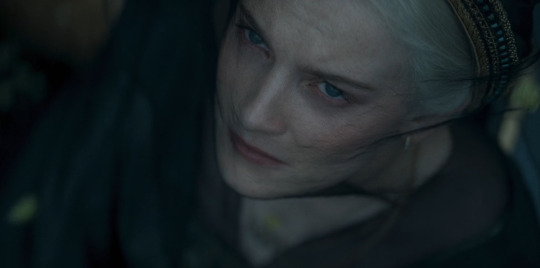
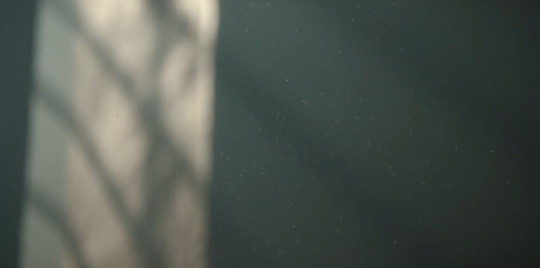
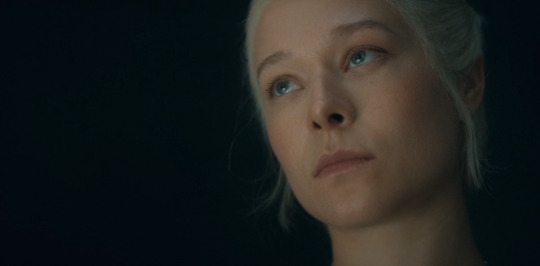
By the time we get to the Red Sowing (2x07), Rhaenyra has changed her mind - she embraced the fire. Burning people alive for power. She might have introduced the "seeds" to Silverwing, who wouldn't have slaughtered them. But she chose Vermithor. She chose their deaths. And the power felt good. It pushed back the fear and trauma of the early season. As Emma put it:
What is going through Rhaenyra’s mind as she watches the Targaryen bastards be devoured and torched alive? "I think she feels like a god. I think she feels super proud." [interview source] [and major credit to darksvster's meta, which gives full details of where Rhaenyra is at in this episode]
Not only does that happen - but in the next episode, her brother Aemond does the same thing. Massacring people and looking down at it, feeling like a god. Feeling powerful again, after having been made to feel powerless by running up against Rhaenyra's new dragonriders at the end of 2x07.
The visual parallel is as stark as the ones earlier in the season were with Helaena:
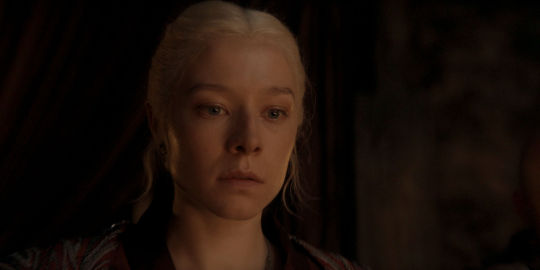
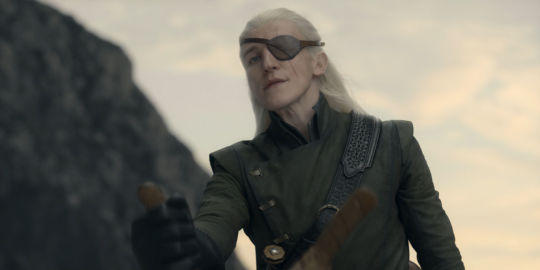
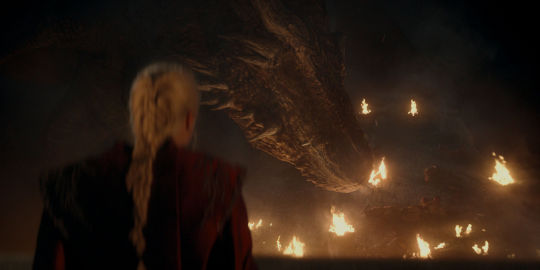
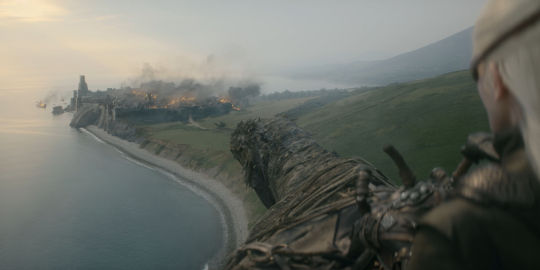
They're not being subtle. She is being positioned opposite a brother - a mirror to her enemy - it's just not Aegon, as some people want. But it makes sense that it's the brother driven enough to *take* the crown against the rules of this society - the position of first born noble daughters and second sons has been compared since season 1. They're so close to being the one with the rights to power and yet there's a barrier.
Both of these siblings have crossed that barrier. They will take what this society will not give them. They will take it with fire and blood.
As we see in the next parallel with Aemond. They literally are twinned in two scenes where an as yet untainted female family member challenges them on their policy of burning cities of innocent people:
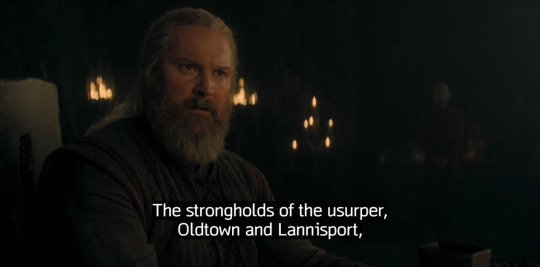
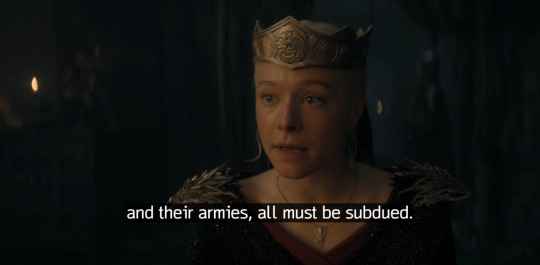
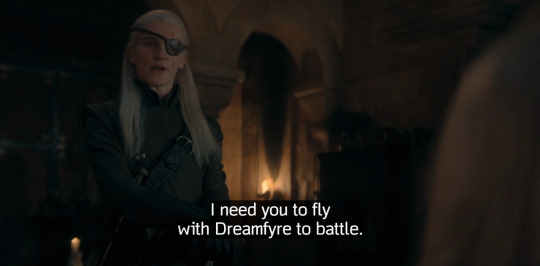
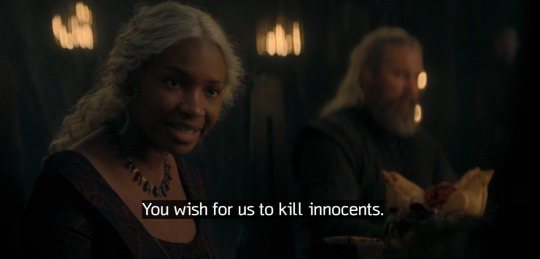
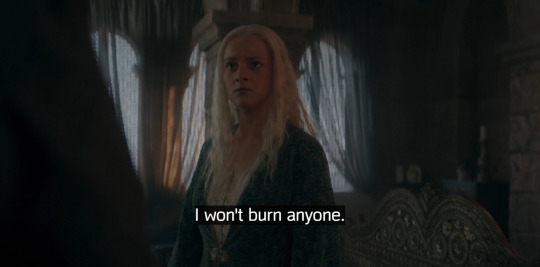
My final note is that now Rhaenyra is on the same page as Daemon as well. She repudiated his behavior earlier in the season, but now she embraces his return and embraces his core logic. She uses his words, his phrase in a scene where imo we are meant to notice that--while love is still there-- she's being much more cruel to Alicent than she would have ever been in the past:
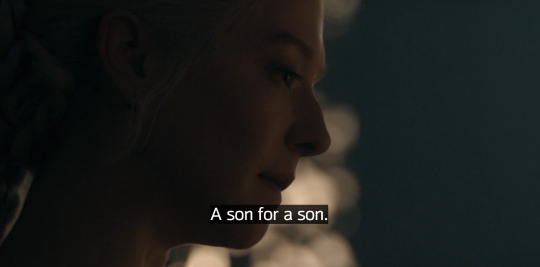
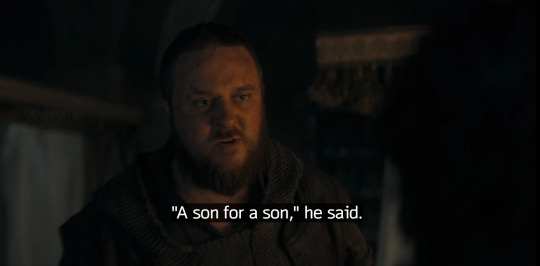
Daemon has changed in the fact that he will recognize her as the reigning queen, but his morality has not changed. Rhaenyra's has - she is now of a similar mindset as Daemon and Aemond. She uses religion--and her conversations with Mysaria about caring for the smallfolk--to justify it to herself and she believes herself righteous. But the actions and their consequences (people burned alive) are the same. And for the same goal of power.
They are doing all of this so artfully--keeping us so tightly in Rhaenyra's pov where she feels justified as she crosses this moral Rubicon--that it can be difficult to see without pulling back and looking at the clues, the shifting parallels, and the ways her behavior by the end of the season is truly, in pivotal ways, not what it would have once been.
#rhaenyra targaryen#aemond targaryen#helaena targaryen#house of the dragon#hotd spoilers#hotd meta#my meta#welcome to Breaking Bad: Queen of Westeros Edition#where we observe the moral disintegration of the protagonist's soul
90 notes
·
View notes
Text
Aeorians and The Gods are Mirrors of Each other
I've seen a lot of discussion about how contrasting and diametrically opposed the mortals and gods are. And (particularly on CR Twitter) that this is a tragedy of oppressive gods striking down mortals who dared to resist.
Well, I don't think that's entirely accurate. Rather than being opposites of each other I think that the Aeorians in power and the Gods are acting more like mirrors for each other. Reflecting the failings and flaws of the other.
Let's take a look at some of the criticisms that the gods have received from both Aeorians and fandom under the Read More (cause long):
the Gods have hoarded power and abilities and resources from mortals to increase their own power
the Gods have used disproportionate violence against and ignored the plight of mortals because they could/because they hated them
the Gods have taken domain of lands/worlds that aren't theirs and done with them as they want - even at the expense of mortals
When it became convenient/dangerous/tough the Gods caused this chaos and abandoned mortals to their fate or worse are actively trying to destroy the mortals
The gods don't care for mortals - at worst mortals are bugs to squash - at best they view mortals as "prized pets" and things to be controlled
Ultimately, having these entities with this much power and resources is fundamentally not just dangerous but an existential threat
There are others but those seem to be the main critiques that I've observed.
Well, now let's take a look at Aeor and Aeorian society that we've learned over the course of Downfall p.1 and p.2
When in Hawk's Hill, the most important goal of Aeorians was taking tribute via food, rare resources, and materials, etc. for their secret project. All the while people starving for food watched on as riches passed them by, and Ayden daring to help them was seen as a huge risk.
Aeorians - during the time of the Age of Arcanum - took a chunk of the earth, raised it (crucially) above the rest of the world because they could and because it signalled their power and superiority over everyone else.
Then during the time of the Calamity, Aeor - as the "last bastion of civilization/mortals" has shuttered their doors. As we saw with Hawk's Hill after the resources were taken on board, those that could *work and serve* were prioritized first. And those that were sick or religious? Left for dead and discarded. (Edit: this is to say nothing about the way Aeorians have tried to eradicate all traces of the natural world and its animals from aeor)
Aeorians have developed the ability to create an entirely new species of people with souls - Aeormatons, they have developed the power of creation. They have also developed a weapon so powerful it can kill gods multiple times over. And the decision of who to target or when is completely in the hands of those in power.
Aeorians have been seen subjugating fiends, devils, demons, constructs, elementals - all symbols of divine power. Humiliating them and displaying their superiority by treating them as pets.
Are you picking up what I'm putting down?
Both the Gods and Mortals are guilty of all of these things. Some more than others.
Civilian Aeorians had no control over the high ranking Aeorians building a weapon or subjugating other species. Just as the Prime Deities were helpless to stop the Betrayer Gods from manipulating mortals into starting the Calamity. Just as they were helpless to do anything other than take up arms to try and prevent a genocide of their children by their siblings.
The power differential there is massive - but the result is the same. Both are groups of people being collectively punished for the crimes of a part of them.
The problem is we've moved passed Mutually Assured Destruction - where theoretically there could be a stalemate because both sides know the other could take them out. We've moved into a situation where both Aeorians and the Gods feel that if they don't shoot first, it is them who will be dead.
Once both sides have determined that to give in/not shoot would mean their destruction? We're headed for a unavoidable trainwreck.
My final takeaway here is that I think Matt has very very intentionally made it so both the Gods and the Mortals are reflections of each other. There is no unequivocal bad guy in power here and there is no unequivocal good guy in power.
The only end result here whether the weapon is completed or the gods strike Aeor down is a tragedy where innocents die because of those in power.
The only end result here is a world in which those in power cause more destruction and death than they ever thought themselves capable of because they felt forced into it or were blinded by their hate. Where even those who thought themselves "good" and "fair" and "helping" look at themselves and the result of their actions and see waste and destruction.
But I do have a question...after the Calamity and seeing what it wrought - the Prime Deities made the decision to not just banish their traitorous siblings away but themselves as well. To limit their own power - and by extension their ability to harm.
Would the Archmages of Aeor have done the same?
I'm not convinced to be honest.
#critical role#cr spoilers#critical role spoilers#calamity downfall#downfall#downfall spoilers#The Prime Deities#The Betrayer Gods#Aeor#cr meta#exu downfall
146 notes
·
View notes
Note
while i do agree with the sentiment that bloodclan should be more nuanced as an entity i still believe it is wrong to portray them as the necessary "response" to clan injustice (haven't read the books in years but i am pretty sure that bloodclan started with no connection to the clans) / an opposition to the clan's flaws. some of the thing scourge did was out of selfishness and bloodclan isn't the other colour of the black and white debacle with the clans. the clans are heavily flawed yes, but it isn't realistic to completely say that their structure had no redeeming qualities altogether and that all outsider groups is fundamentally better than the clans.
all clans and groups are flawed in their own way and i believe we shouldnt brush past the things that other groups (the sisters and what they do with their toms *cough cough*) did solely to be able to degrade the clans and their culture.
Buddy, you're setting up a strawman. I promise you that if you look into the reduxes I've made of BloodClan, Guardians, The Sisters, and the Tribe, you will see that I don't make any of them a "flawless" alternative to Clan life.
Nor do I say that the Clans have no redeeming qualities. In fact, you can browse the "Clan Culture" tag to see the various expansions I've made to show how these traditions, values, and technological advances make Clan life so alluring.
The overarching theme of BB is that the nature of culture is change. For better AND for worse.
With respect, I think there's something insidious in the wording of "the things the other groups did." We're talking about fan responses to a work that consistently demonizes and degrades foreigners to make the Clans look like the "best way to live," justifying xenophobia. These are not real groups, they are writing choices.
In the franchise with some pretty extreme examples of misogyny, the authors said "What if bizarro world where women rule and have no men... woag..." and only includes a single Clan-alligned member of this culture, with a BAD opinion of them, who can't even do his diplomatic job because he HATES them so much.
In the same franchise that shows Fireheart getting bullied, facing prejudice, and fighting a murderous tyrant who publically executes a mixed-race character, their endgame villain is an outsider, like him, but this one IS a godless heathen who HATES love and friendship and banned families.
In the VERY same franchise which made its first non-malicious group barely able to get through an arc without needing to be saved by Clan cats, totally unable to defend themselves, framed as "whiny" for not wanting their clearly 'inferior' culture to be forcefully changed.
And I'm re-stating all this because, again, no offense to you in particular Anon, but I've been seeing a few people with a sentiment like yours lately. Complaints into a vacuum that don't make targeted critique of anyone's fanworks, gesturing at this broad "woobification" which is apparently out there somewhere over the rainbow, saying things like "well Scourge is selfish" or "well Moonlight abandoned her 13 year old" as if we haven't BEEN knew.
As if we're not all directly responding to these choices. As if I haven't written ESSAYS on this topic.
Since this was about BloodClan in particular though, and you admit you haven't read the books in years, please go back and actually read Rise of Scourge before trying to make critique of the ways fanon rewrites its origin. It's EXPLICITLY a response to the Clans, in the text, that the Erins wrote, it is canon that fanon is working with.
And you want people to take that out and approach it a different way... why? Because it's so incredulous to you that a nation forms in response to a threatening neighbor? That a common enemy through invasions is a way that people might choose to unite, and encourage their new culture to value brutality? Because you don't like the idea of Clan Culture's XENOPHOBIC BATTLE CULTURE affecting surrounding communities??
Could YOU, maybe, be doing this "woobification" thing I keep hearing about? Can I play this stupid game too? What's our stupid prize? Can it be a lollipop? Do we get stickers
TL;DR, ok.
#bone babble#Warrior cats analysis#Warrior cats fanon#Bloodclan#''Ok yes scourge is practically cold war era xenophobic stereotypes and i understand that is a part of canon you dont like.''#''But have you considered. Hes mean''#Yes. Yes i have considered it.#If I get another take like this in my inbox im gojng to fucjing add a scene where he kisses babies and looks at the screen and says#'Mmm wowow thank u for the babygirl juice fire star :)'#JUST to annoy them#People gonna be funny to me? Im about to be Hilarious.#Also ANON just to be clear im annoyed because like. Ive been seeing this around.#Sadly today you are the Genocide Frisk to my Angry Sans u.u#I am taking ur ask and turning it blue and smashing it against walls#Man it would be cool to have bone themed powers... i am a bone guy...#But anon you're fine. Just like. Think about what I said ok?
190 notes
·
View notes
Text
WoT Meta: Prophecies, Fated Lovers, and Robert Jordan's knack for finding the nuance underneath the myth
One complaint I've never understood about the way Jordan writes romances is the persistent claim that he over uses the 'prophesied love' trope.
In part for me, I think it's a little bit folks not seeing the forest for the trees. WoT is fundamentally about the relationship between myth and reality: the place where the fallen angel meets the disgruntled academic, the bitter accountant, and the man who never got over being too short. It's a story where the messiah is real and dealing with chronic pain and PTSD from his stigmata. Where a legendary High Queen has to deal with both marching armies to the apocalypse, and the irritating banal realities of being pregnant at the same time. Of course Jordan digs into the idea of prophesied love- it's a huge theme in folklore and mythologies the world over. Jordan wants to dig into what it really means for there to be a person out there that you are destined to be with: that is a match for you, decreed so by the universe itself....and that you get absolutely no agency and choice in choosing. If anything Tumblr, which adores the 'red string of fate'/'soulmark'/'soulmates share pain'/'world is black until you look into your soulmates eyes' (to name a few of the more prevalent ones- some of which Tumblr practically invented), should be super on board for the parade of fated lovers to be found in WoT. It's nothing short of baffling to me that their not more fondly viewed.
And I think that is tied to the follow up complaint: the criticism that Jordan 'uses prophecy love as a replacement for a romance arc'. But that is something that is just. Patently untrue.
Cause the thing is that is how soulmates are often used...in the majority of soulmate au fanfics you find here and on AO3- an excuse to get the really hard part (two characters realizing they are right for each other and love each other, then having the communication skills to articulate that so they can start a relationship) out of the way, so the author can focus on the fluff or angst or other part they and the audience want to get to. And that's fine! But that's not at all what Jordan does. Just like he does with the Prophecies of the Dragon, or Elaida's fortellings, or even just most of Min's viewings- Jordan takes the idea of the prophecy soulmate, this person decreed by some higher power to be Perfect For You and being right about it, and digs deeper, shining it in different lights and attacking it from different angles. Jordan gives the concept of the soulmate teeth, explores the spines and the sharp points of it: is it real love if it's fated and not your choice? Can you trust your own feelings, or are they fate's design working against you as surely as Aphrodite worked against Helen or Eros against Apollo? What is it like, to see someone one day, and know, beyond a shadow of a doubt that you would love this stranger? This question mark? This wildcard?
Rand's relationships with Min and Aviendha, as well as Mat and Tuon's courtship are great examples of this conundrum. Min and Aviendha have completely opposite reactions to the same information that demonstrates their unique strengths and weaknesses as characters and people, while Tuon and Mat's courtship is all about two people who know they will marry trying to figure out what that means, without ever confronting the reality of those prophecies directly.
Min, as befits a Seer who has learned time and time again that her viewings can not be changed, has resigned herself in an almost fatalistic fashion to all of them, and to loving Rand no less. Min knows that she, and two others, will love him, and she accepts its inevitability the same way she accepts Colavere's death, or Logain's glory, or the shattering of the White Tower. What is, is, and there is no sense or point in struggling against it. What concerns her a great deal more is what she doesn't know- she doesn't know if Rand will love her in return, she doesn't know the identity of the other two women who will love him, and she doesn't know if he will fall in love with one or both of the others but not her. Add to that Min's own insecurities about how she stands out and doesn't fit what her society deems 'proper', between her crossdressing, and her offputting manners, and it makes perfect sense that she's worried about making Rand love her. She doesn't mind sharing him- she hates the idea of being in love with a man who doesn't love her in return, of being stuck like 'Elmindreda' of the stories, sighing and pining endlessly for a man instead of being able to act, to take control of her own fate.
So she takes control: she learns to flirt from Leane, works hard at making herself desirable, and also indispensable: with her visions, her advice, even just her emotional support to Rand when he otherwise has no one else. The irony is that whenever Rand thinks of Min prior to her return to his side in LoC, it's about how much he liked her earthy honesty and lack of wiles: how she was earnest and made him feel at ease, and didn't 'spin his head like a top'- and that's still what he loves about her after they get together: the fact that she isn't fooled by his front, that she sees him clearly and refuses to be driven away the way so many others are so easily. The point is that Min never had to change, and in the ways that matter she didn't- she only thought she did because of her own fatalism.
Contrast that with Aviendha, who, after learning about being destined to fall in love with Rand, does everything in her power to prevent that outcome- because she is a warrior, a soldier, who has never yet met a problem that could not be killed, endured, or retreated from. Aviendha values nothing so much as her honor and her word- she has promised to keep Rand safe for Elayne and what greater act of dishonor could there be in that situation then not just failing in that promise, but despoiling (and she does view it that way) said man herself? So she is awful to him in the hopes of poisoning the well of affection or at least keeping him far enough away that she is never tempted. Aviendha hurls contempt and anger at him, berates him, does everything short of trying to stab him in an effort to make him hate her, and it doesn't work. Despite all her efforts to keep her thorny wall up, they are literally made for each other and can not help but be drawn together time and again. Despite all her efforts to insist, to him and herself, that she hates him, she can not hide entirely that the opposite is true: that she likes him, sees his strength and courage and resilience, and is a little in awe of his generous kindness.
This is why she vacillates wildly between wanting desperately to get away from him in The Fires of Heaven, to not wanting to leave his side: they are two planets caught in each other's gravity, with about as much chance of escaping each other. When she resorts to the last recourse of a soldier- retreat- and runs headlong into a blizzard that would surely kill her, Rand follows to try and save her life and she can deny the truth that she loves him no longer, nor can she resist taking him, even knowing that to redress that balance, she will one day have to offer her life to Elayne (as she attempts to do in LoC)- though fate still has other plans in store.
But in many ways the apex of this, the relationship that really shows Jordan's deconstruction of this trope, is Mat and Tuon. Before they ever lay eyes on each other, each is given a prophecy that they will marry the other: not that they'll love each other, not that they will be able to trust each other, not even that that will like each other: just that they will marry. And their strange courtship is a result of this knowledge, as each attempts to suss out the other, to try and understand them without ever overplaying their own hand. Each believes that the moment they admit their prophecy they will destroy any chance of real connection or understanding.
To Tuon, if Mat learns he is destined to wed her he gains something she can not abide: power over her, leverage that could be used to subvert her own plans and visions- because nothing matters more to Tuon than control, especially over herself. So she keeps her 'fortune' secret and tries to figure out: What will it mean to be married to Mat? Will he be a pretty trophy? A liability? A threat to her Empire? Will she have to kill him once she gets her heirs?
To Mat, if Tuon learns of his prophecy, she gains the power to take away his freedom, to snare and collar him and bind him to her, because that's how Mat deep down views marriage: as a binding cord, a loss of freedom, and nothing matters to Mat more than freedom. So he keeps his *Finn gained knowledge secret and tries to figure out: What will it mean to be collared by Tuon? Will she she treat him as a pretty and plaything the way Tylin did? Will she try to use him against Rand and the Westlands? Will she make him a slave and sent him to be beaten anytime he disobeys her? Will he have no choice but to fight her one day, this woman he is going to swear to spend his life with? Will he have to kill her the way he did Melindhra, and carry that guilt of mariticide on top of all else?
So the two stay in their strange limbo, because as long as they don't admit it out loud to the other, they can pretend they are still two people forced together by happenstance, and (each thinks) they can continue to try and understand and figure out the other, to find out where this inevitability of their marriage will really leave them, and if there can be even the faintest possibility of love in such circumstances. And that limbo- that protracted refusal to act as if they are under fate's direction- is what allows them to build a genuine bond of trust and respect for each other, and to start seeing the other person with the clarity that love requires. All this, so that when Tuon finally does play her hand, and reveal the truth....it's obvious they've long since fallen in love with each other (even though Tuon won't admit that to herself), and come to trust each other (even though Mat won't admit that to himself).
And the thing is- all of Jordan’s prophecy romances are written like this: from Egwene seeing that loving Gawyn might be both their downfalls in LoC and seeking him out anyways, to Perrin misinterpreting the 'falcon and hawk' viewing and thinking Faile is a danger to him when she's the love of his life, to Galad and Berelain not even being AWARE they’re fated to fall in love and just....do, at wild first sight (Another classic folklore/mythology trope). They also never find out: always remaining unaware that the Pattern had long since decreed that they would be together and being incredibly funny/annoying about it. The prophesied love is an example of classic Jordan: taking a common, maybe even ubiquitous premise, and asking those complicating questions that allow him to write it as something much more nuanced and interesting and fascinating. And he gets no credit for it, send tumble.
#Wheel of Time#WoT#Robert Jordan#WoT Meta#Wheel of Time Meta#Min Farshaw#Aviendha#Rand al'Thor#Mat Cauthon#tuon athaem kore paendrag#randmin#avirand#mat x tuon#matuon#WoT Book Spoilers#TOM Spoilers#I wanted to write more about some of the other Fated Lovers pairs in the series but this already got insanely long
149 notes
·
View notes
Text
After questioning it, Fujimoto sets fire to his own creation
Witch, cremation, CSM wannabe... what if the work we love was burning?
You might think that the shortness of this chapter means that it doesn't say much, but the opposite is true - it's overflowing with richness and coherence.

The first thing that impressed me was the mastery of the action, particularly Quanxi's attitude during this very scene

The fact that Quanxi bit Fumiko was nothing more than a way of controlling her future pain; she had perfectly understood that she was going to lose her legs as a result of the fall, just as she couldn't bite herself.
I also like the way we understand how extremely fast her regeneration capacity is, in just a few seconds her leg is healed, and the fake chainsaw men don't even have time to get any closer before their heads are flying.
Apart from the action, the chapter is also very rich in dialogue

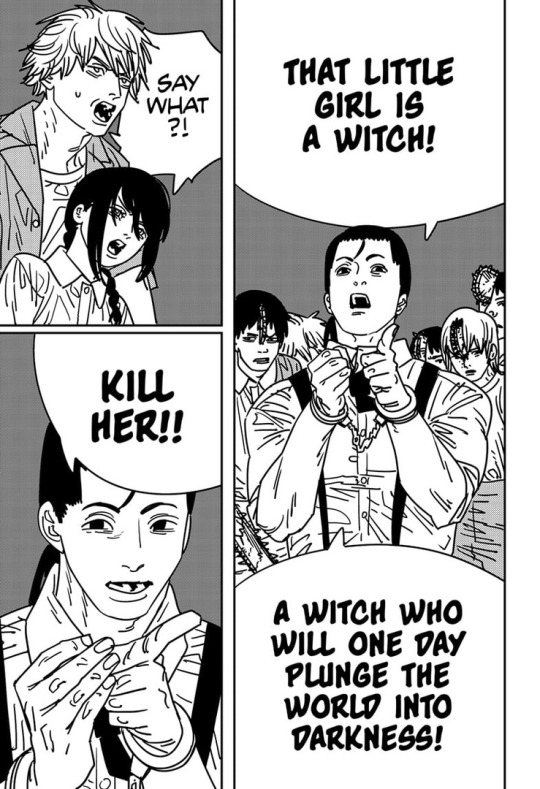
I'd like to come back to Barem's characterisation of Nayuta as not only a witch but also an ex-Makima.
First of all, it makes sense in terms of the scenario, because if Nayuta were to die, there'd be no more locks, and the public hunters' dilemma would also fall by the wayside.
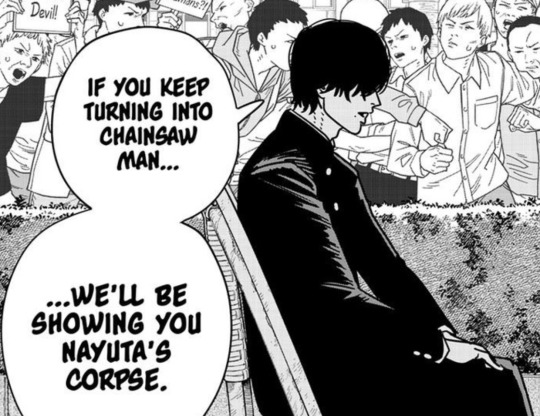
But we can dig even deeper, whether in the character of Barem or that of Nayuta.
It's not insignificant that the flame-throwing weapon is the one who starts the witch-hunt, just as it's not insignificant that it's Barem who says it, given that he's a character we can describe as religious.
I think Barem is the weapon with the most resentment towards his instrumentalisation, he also sees Nayuta as a threat because she was a former mistress of the weapons.

But above all, why is the control demon closer to a witch than a demon?
Obviously, when we think of witches, we all think of witch-hunting, but let's take the reasoning to its logical conclusion: why hunt witches? The witch is the symbol of what must be eradicated, of a close link with evil, but above all a pretext for the powers that be to eliminate women who represent a form of power.
Calling Makima a witch is consistent, but at the same time it differs in a few respects: she wasn't driven out by the government, she was deliberately put in place by it. But calling Nayuta a witch instead of a demon is consistent, because she's a demon who, despite her desire for control, blends in with humans.
Nayuta sticks to her role as a little girl, whether it's her interest in school or her focus on her family with Denji.
Makima also had a real desire to integrate, despite the fact that her only response to socialisation was domination.


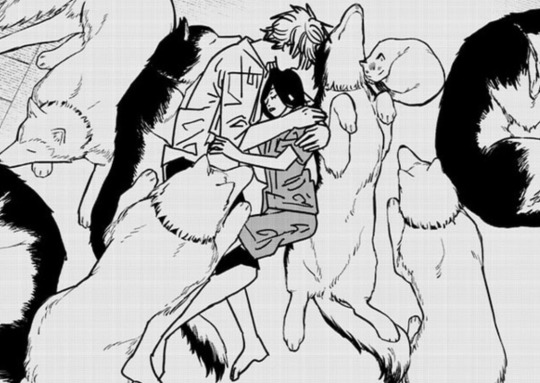
But she remains a witch, not because she is persecuted, but because she persecutes.
It's not a question of demonising Nayuta, but of not presenting her as a cute, nice girl. I don't understand how some people think that the antagonist of part 1 could have been magically diluted by the power of love. Nayuta is no longer a tool, but she's still a demon exerting a form of control over Denji in his isolation.

Nayuta isn't Machiavellian and she thinks that by preventing Denji from seeing Asa, for example, she's protecting him. What's more, Denji deliberately isolates himself and thinks that Nayuta is the only one who will accept him. While he was psyching himself out over his wet dog smell after Asa's rejection, Nayuta, who claims to love the smell, only confirms this point of view.


Once again, the control demon's objective is always the pursuit of happiness for both of them, just as it was for Makima with Pochita or Nayuta with Denji. The control demon's obsession with Chainsaw Man is what marks the continuity between Makima and Nayuta.

Nayuta's character may not be fundamentally different from Makima's, she's just marked by a more infantile control that's more demonstrative and noisy than adult control, which is colder and more insidious.
That's why I'm changing the premise, I think Nayuta is still Makima, but she's simply changed environment.
When Barem pretends he's heard Chainsaw Man, I don't think it's as absurd as it sounds, he's the one who's most piercing about Denji in each of his interactions, he's insisting on something that Denji isn't admitting to himself.

Whether it's his desire to become Chainsaw Man again in spite of Nayuta, or the fact that Denji also likes to have fans by presenting himself as one, I think that without saying that Denji wants his little sister dead, he thinks she's a witch...
Witch and not demon, Nayuta is not the threat of an enemy, of a demon that CSM should eliminate, but she is not a human little sister, she is dangerous in her need to control her brother.
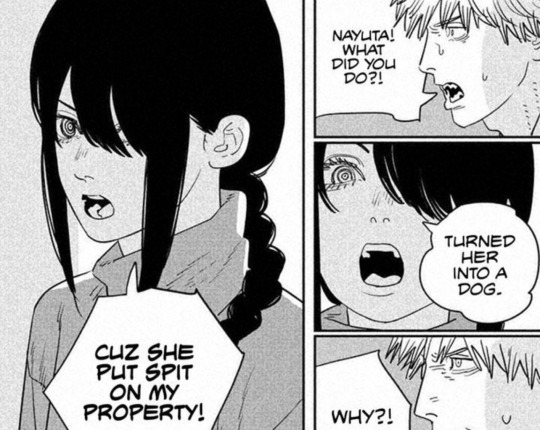
I adore Nayuta, so I don't want people to think that I hold her responsible for everything, but I see a kind of taboo in the way some fans refuse to see her as anything other than the idyllic little sister
CSM is grey, each positive facet will have a negative facet. Denji's relationship with his little sister is full of contradictory desires that also need to be pointed out.
I think this chapter just points out the taboos, for example by calling Denji a CSM wannabe, I think that's a part of the character that's often overlooked.

CSM is part of Denji's identity, but it's as much a role he's taken on as a mask he hides behind.
To avoid facing up to his own existential difficulties, Denji hides behind Chainsaw Man, convinced that the only way to love him is to discover that he is Chainsaw Man, as if it wasn't possible to simply love the boy.
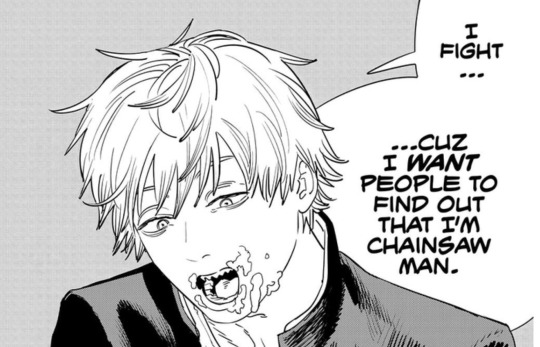
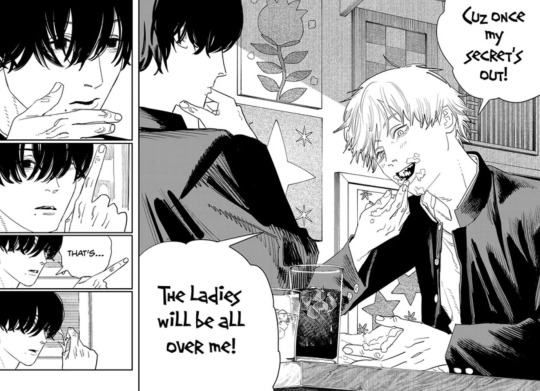
Just as the only time Denji expressly confesses his feelings is when he's Chainsaw Man. Denji has never spoken of his grief as a human again, just as he has never come to terms with his dream of having sex.
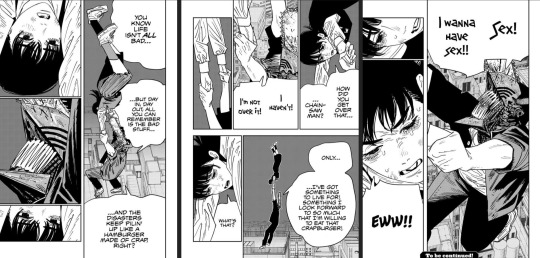
Chainsaw Man is the semblance of confidence that allows Denji to be himself. Didn't you notice how silent and passive he was as a human in the last arc?
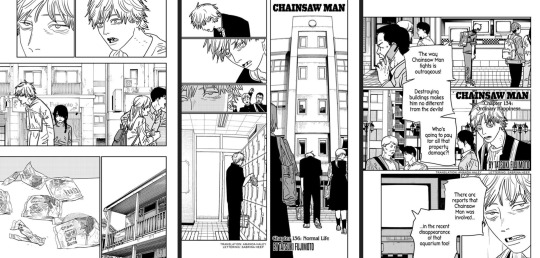
Fujimoto questioned one thing throughout part 2: what is Chainsaw Man? Is he the hero that a whole generation of people are fans of, Yoru's enemy, Pochita, that impostor, Denji's identity or... isn't he more all those moments when Denji is himself?
Yoshida had wondered whether CSM would eat the demon of death, and Denji's answer to that question is to go and help Asa without a mask, just by encouraging her. Having just identified the great king of terror as the demon of death, the way to eradicate him also lies in Denji finding solutions not just in Chainsaw Man but in himself and in relying on others. Denji must come to terms with who he is and his isolation.

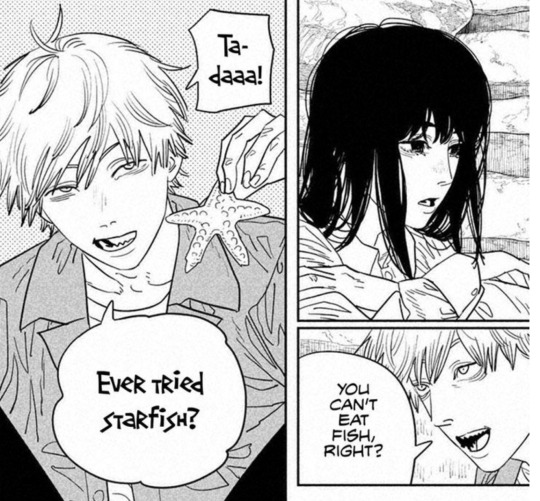
By setting up a protagonist who, like the former protagonist, experiences repeated bereavements, Fujimoto questions the outcome of grief. Hiding behind Chainsaw Man, isolating himself with Nayuta, is a form of withdrawal. The demon of death is already present in the way Asa and Denji tend to cope with the death of their loved ones.
The door symbol for Denji, the cat for Asa.
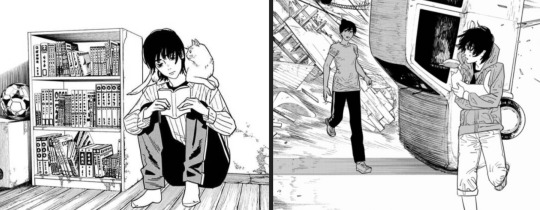

That's why this work is a first break. The only way to eradicate these fake Chainsaw Man is through cremation, as this prevents them from using their blood to live again. This explains the immortality of the weapons, following the same logic: human blood constantly feeds a demonic heart capable of regenerating itself.

Denji's first response is to burn. Whether it's to emancipate himself from Chainsaw Man, by burning as a simple wannabe of himself, because Denji fantasises about an identity of which he is not the only possessor.
But cremation is just as much a response as escaping the witches - the isolation imposed by the demon of control - but cremation is also a stage in mourning.
When we see the coffin of a loved one being lowered into the crematorium, it's an unheard-of act of violence, but it also symbolises the fact that there's no turning back, that it's a violent impetus to move forward.
The person who has all the answers to all these facets of grief is none other than Power. Denji must also reclaim his identity as a co-contractor with the blood demon, just as he must reconnect with the painful memory to make the demon his "Buddy" again, but above all, Denji has two little sisters, so he mustn't isolate himself with just one. Blood is the key to regeneration, and she is the key to moving forward.
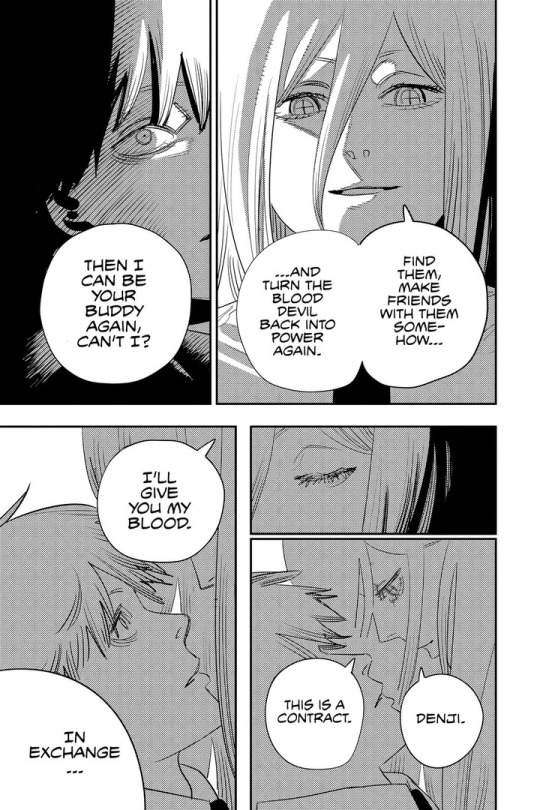

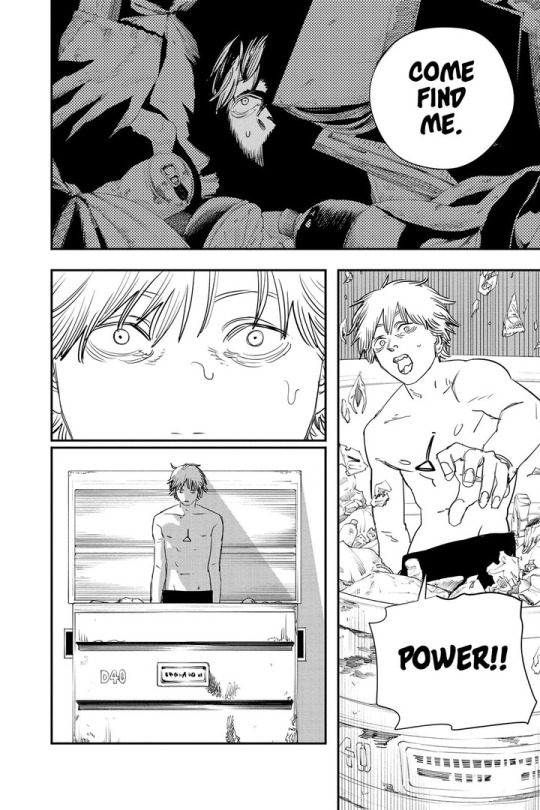
Fujimoto showed in the last arc how "Chainsaw Man" wasn't a satisfactory answer for his protagonist, so now he's setting fire to what has been established as a bad lead.
Fujimoto burns down all the taboos, all the biases we had about the characters but also the ones they have about themselves.
If Chainsaw Man is to continue as a work of art, the title must be crossed out.
The question is, what will replace it?

#chainsaw man#csm part 2#csm#csm spoilers#csm 147#chainsaw man 147#quanxi#yoshida#denji#nayuta#makima#power#asa#asa mitaka#barem
223 notes
·
View notes
Text
DA:V spoilers, and obligatory complaint about how little of this is explicit in the game vs how much i have to read between the lines for it but -- i was thinking about the difference between Neve and Lucanis romance possibilities dependent upon which city is saved.
i know some folks have complained that if you 'harden' Lucanis by saving Minrathous, you can't romance him; vs still being able to romance Neve in the opposite situation -- but i honestly think it makes sense.
note: in my first game i romanced Lucanis, saved Treviso. this game, i saved Minrathous (probably romancing Neve) to see the differences. i am not very far into this file yet so the below is just my initial vibes on it all.
because the thing about Lucanis that is different from Neve isn't just the obvious fact that they're different people lol -- but he literally just got rescued from an entire year of confinement and torture, knowing that he was betrayed by someone to get him there. he's got a literal demon inside him, and figurative ones, too. he spent that year daydreaming about things like going to Cafe Pietra for a very specific blend of coffee -- dreaming about the simple daily pleasures of his city, which he so clearly loves, helped to keep him sane and determined in the face of it all. (Spite is/was a Determination spirit, do recall, per a Seer we meet in Rivain.)
then you show up and you rescue him! and he returns home, his contract on Calivan at last fulfilled -- to discover that his grandmother, whom he loves, is dead, killed by, again, betrayal. (the nature of an emotional connection to someone who treated him the way Caterina did while training him as a Crow is yet another whole different essay i'm not writing here, but he obviously loves her dearly all the same.)
a year in a cruel prison, and when he finally is freed, his grandmother is dead. the betrayal continues, the larger enemy is still out there despite taking Calivan down; Treviso has been occupied by the Antaam and worse, now the whole world is on fire. but Treviso is still there. Treviso, with its cafes and its markets, its people with their spirit unbroken under occupation. he has that to cling to, just like he did while in the Ossuary.
and then the person who saved him from the Ossuary -- turns around and, to his view, betrays him, and betrays Treviso, by going somewhere else when Lucanis and his city were in need. the missive he sends while he's away afterward tells you that it's worse than you thought at first, that everything about the city which had survived the occupation has not survived the Blight. the things that were keeping him sane and grounded are gone, and he has to feel like a lifeline is gone with it. a part of himself.
is it any wonder he shuts himself off entirely from the person who took that from him?
by contrast, Neve loves her city too but she's also been fighting it, and its own worst impulses, forever. she doesn't cling to an idealized version of it, using it as a prop for her own sense of herself. honestly the opposite is likely true; she thinks it can be better, yes, but in her cases, she's seen the worst in human nature over and over again, and she understands making hard choices. it takes her a while to trust you again, but it's possible, and while she's hardened, it doesn't wound something fundamental in her the same way it does to Lucanis.
32 notes
·
View notes
Text
Nuance in (The Sandman) Fandom
Send me asks about everything Sandman-related!
I thought a lot over the past few days, partly prompted by discourse on here, partly due to a couple of “interesting” asks and messages I received (the type you don’t answer). I *think* they might have been prompted by engaging in discourse on topics like anti-blackness/racism, misogyny/sexism, TERF characters etc in The Sandman.
Fandoms are always getting super sensitive if someone shines a critical lens on their favourite works, authors and characters. So to make this clear (in case it isn’t already obvious from my brain-rot blog):
I love The Sandman. I love Neil Gaiman. I have an extremely soft spot for Dream (and Desire btw, who deserves a lot more character analysis than just being summed up as “villainous, sexy bitch”. One day, perhaps ;)).
I can read The Sandman and just get lost in the story, even after decades and many rereads.
But I can also view it through a critical lens—these things aren’t mutually exclusive.
Not critical enough or too critical?
As fans, we can get trapped in certain thinking patterns, like:
“My blorbo can do no wrong”-syndrome
“Characters with flaws are inherently problematic and imply authorial endorsement of those actions”
“Characterisation and problematic subtext are one and the same” (aka overanalysing and looking for problems where there are none is the death of every story, but failing to see problematic patterns where they are clearly visible is a problem, too).
Don't say anything bad about my favourite character
I think this doesn’t need much further exploration. It’s not my personal way of looking at stories through permanently rose-tinted glasses (I always feel it stalls my experience, but my experience is not everyone else's). Some people prefer that type of escapism, and I’m good with that (although the downside is of course that by not willing to engage with issues, we can unwillingly perpetuate them). Live and let live, ship and let sail. But please, for the love of god: Don’t insult people via their inboxes or messages just because their opinions and preferences don’t align with yours. I’m not going to sugarcoat it or phrase it “nicely”: It’s infantile (and a form of bullying btw), end of.
How can you even like a character who's so horrible? And that author must be equally horrible, too
We have to separate flawed characters, even those who are written to be really problematic, from real-life endorsement of these actions.
Author, narrator and character are three fundamentally different things, and don’t overlap as much as some people seem to think.
We can write vile, despicable characters to make a point (for me, Thessaly was always a prime example for this, and I explained why here). We probably hate them as we write them. I don’t know what else to say, but this facet of writing seems to get more and more lost on people, and it’s a worry. Crying for sanitised characterisation is one step away from censorship. We explore what is problematic about people and humanity through story. That’s how we process and learn. It’s nothing new, but it becomes impossible if we can’t write flawed and even disgusting characters.
Face value…
Since I’m mostly in The Sandman fandom, I often read that its ending is hopeless, and that’s supposedly the entire message.
It is agonisingly sad, yes. But is it truly hopeless? I personally see it as quite the opposite, but of course that’s my opinion, coloured by my life experiences.
I also get that show-only fans often haven’t read the comics, or at least not the whole arc. And as such, their outlook from what they’ve seen so far (and choose to focus on) has to be different by default. I also understand that many people are quite new to the comics, even if they have read them in their entirety. I’ve sat with them for 30 years, and I still find new things on every reread (and I read it more times than anyone should 🙈), and I still don’t feel like I’ve understood it all. Perhaps because I still haven’t fully understood myself (and it’s unlikely I ever will). If there’s one thing The Sandman isn’t, it’s one-dimensional and easy to grasp in its whole depth.
I just wrote a ginormous meta on it, if you’re interested, it’s here:
Subtext, (not so) glorious subtext
This is where it gets complicated:
We shouldn’t mix up characterisation and story subtext. Overanalysing every line to death will always make us find something that’s “problematic”, when it really isn’t in the wider context of the story.
Zooming in is NOT always a good thing. Sometimes, we actually need to zoom out.
But subtext *can be* (accidentally) problematic. Even in stories we love. And none of this negates what I previously wrote.
Stories have real-life implications of sorts, and we need to be able to talk about it. That’s where those slightly flabbergasting, hostile inbox messages come in, and I want to expand on that "topic of contention" a bit:
Neil himself confirmed that the Endless basically warp reality, and that this is why, after Dream’s failed relationship with Nada, many black women in his vicinity suffer terrible fates (Ruby and Carla in particular). And that this spell is only broken when he dies, and that it is the reason why Gwen doesn’t suffer the same fate. And said Gwen then gets used as a plot device to basically absolve Hob (who canonically really is a problematic character, whether show-only fans like it or not) from his slaver past. Once again, very clearly: No one is making this up. Neil confirmed it (for the comics, and that was over 20 years ago. It remains to be seen if his stance has changed as we move into that arc in the TV show).
I don't think it is correct to imply that Dream as a character is racist (I've read that, too) because he logically can’t be. He holds *all* the collective unconscious. He is also, strictly speaking, not white. He is everything and nothing, and he shows up in many different ethnicities throughout the whole arc, depending on who looks at him. But Neil played with a subtext here (reality warping due to a bad relationship which then affects everyone with similar physical traits) that will read very differently to a black person than it reads to a white person, and we have to understand why that is an *extremely* slippery slope.
Plus, we are supposed to see Hob, who *was* a racist at some point (you can’t not be if you’re a slave-trader—it’s impossible by default) as redeemed. And yes, he *does* regret deeply, good for him (and if I were saying this aloud, you would hear the sarcasm in my voice, because it is indeed all about him. We are to sympathise/empathise with him and his character growth while there isn’t much mention of the people he maltreated). But also: it was a black woman who basically forgave him (with dialogue that personally makes me cringe). And that black woman who offers forgiveness is not truly a black woman—she is a character written by a white man. And as much as author and character are not the same (see above), there is an inherent sensitivity in that power imbalance that we can't brush under the carpet.
I don’t think Neil is racist. Probably quite the opposite, and I can even see that his intentions were good from a storytelling point of view. BUT intention and impact are two fundamentally different things, and telling the story this way (comic version) betrays blindspots only white people have. Just like women have blindspots when they tell stories about men, and men have blindspots when they tell stories about women (and there are a few of those in The Sandman, too). And and and…
As storytellers, we can’t always speak from lived experience. It’s impossible. And that also means we occasionally make mistakes that look bad in hindsight, even if our intentions were good.
I guess the proof is in the pudding: What do we do when people who *have* that lived experience tell us it looks bad? If they inform us why it is hurtful, plays into old stereotypes etc?
Are we willing to listen and yield (both are the foundations of allyship btw), or are we insisting that our viewpoint as someone *without* lived experience is right? That lived experience extends to all lived experiences (sex/gender, sexual orientation, age...), and from all we’ve heard from Neil so far, it seems important to him to rewrite what he sees differently today. Whether they’ll always get it right for the show—we’ll see. At the moment, it looks a lot better than in the comics, and certain issues are already being handled with a lot more sensitivity, but a few problems remain.
Pushing back on criticism that comes from people with lived experience is problematic—I’d encourage us to think about what it looks like if a white majority in the fandom is basically saying that the opinions of POC are essentially “overreactions” (and yes, that happened).
It’s complicated. The Sandman was written in a different time, and I think we have to distinguish between things that weren’t really problematic at the time but have aged poorly (again, Thessaly springs to mind, and I have lived experience as a queer person during that time, so I can see it in context while at the same time acknowledging that I would make changes to bring it to the present day), and things that were always a problem due to blindspots. They were a problem in 1990, and if they don’t get changed, they are still a problem today.
This fandom is generally so much more open and nicer than others I know. But that doesn’t mean it’s infallible, because it’s full of humans.
Nuance is sorely needed, in both story interpretation and interaction between said humans.
#sandman#the sandman#dream of the endless#hob gadling#morpheus#the sandman comics#the sandman netflix#sandman meta#fandom blindspots#fandom discourse#sandman spoilers#nada#nada sandman
190 notes
·
View notes
Text
Reflections? (Yesterday's Lie)
The term “holding up a mirror” usually applies to confronting someone with their own actions and pointing out their flaws. Stories like to do this through foils that share enough characteristics to annoy each other, or villains and heroes that are either the best or worst version of each other. It’s a really neat piece of storytelling.
Yesterday’s Lie is this idea in its most blatant form. Luz literally looks into a mirror and argues with her reflection. Its straightforward and simple.
Except this is The Owl House, it’s not capable of playing anything straight.
Let me explain.
SPOILERS AHEAD: (The Owl House, Dead Poet Society, Billy Elliot, Gravity Falls)

One of The Owl House’s core thematic is individuality and the joy of complexity. It is a story about taking life as it is and not putting unfair constraints on it.
This is why the show is so tropey and so averse to tropes at the same time. It makes a beeline for the closest stock structure and then thoroughly dissects and subverts it. It’s a satire, a hunter of cliches.
As a way of hammering that home, everything in the series is introduced twice. Whenever any plot beat or location is revealed, you get a first pass and a shallow look at that thing, and you get an obvious trope that this first appearance fits into, then you spend time with the thing, and you start to understand just how much that first impression was deceiving. This happens to everything, even the show itself.
The series opens with the famous “eat this sucka!” line and a fantasy witch story, priming you to expect generic fantasy, but you are then met with The Owl House, which is anything but.

Hey look, a conspicuously hidden character from a family photo. This is foreshadowing for a later episode. But if you think about it, this filmmaking technique is weird, right? Telling you something is important by now showing you it at all. I don't have anywhere I'm going with this, it's just something quirky about cinematography.
This also happens to the characters, and I go into more detail about it in my post about the first episode, so take a look at that if it interests you. But there was one notable exception to the rule. Camila Noceda.

When we first see Camila, she is the distant parent, the stock character in a million coming of age stories. She doesn’t really get her child and is sending them off to a place to make them more “normal”. It's going to be a difficult relationship, and the parent won’t get more depth beyond this.
She fits in with Niel’s parents in Dead Poet Society and Jackie from Billy Elliot. Stern, and antagonistic as a result of the theming. Like I said, the story is about how people can’t be defined, and here is a character who wants to box in the protagonist.
Notably, Dead Poet Society ends with the death of Niel as a direct result of the parental strictness, which isn’t a good sign for how this might turn out.
Then Luz runs away, and we don’t get to see anything beyond the stereotype for a season and a half. We instead get Luz feeling guilty and confronting her fears of betraying her mother through a monster that pretends to be that fear. We still don’t meet Camila.
Until we do, and things are immediately different.

The Camila Noceda from season one was refined and busy. She had a uniform on, and her hair up in a tight bun. It’s a refined image that looks down on you with distain. Now, however, she has let her hair down and wears more casual clothes over that uniform, she’s practical but laid back. She’s had things added to her instead of taken away.
It's also notable that the first thing she does in this episode is help a wounded creature. Camila’s second introduction is one of fundamental kindness.

Meanwhile, Vee is Luz’s reflection, except no she isn’t at all. She is the polar opposite of Luz. She wants mundanity rather than adventure, she wants a new life rather than both lives at once, she actively disguises herself rather than seeking to be understood. Vee is only Luz in appearance. Case and point:

Luz - "Cool, talking rats. Maybe they know something." Vee - "(Screams and runs away)"
Camila is aware that something is up, but she’s not used to the magical world that we are, so she assumes that Luz has changed, and she is concerned that the summer camp thing has worked too well.
Vee also gets the multiple introductions. A few episodes ago, she was shown as a shadowy figure who had replaced Luz like a changeling and the filmmaking heavily implied a Machiavellian air to the character. The musical sting, the shot composition and build up, this was a villain.
Then we meet her and she’s a wus. She’s cowardly, and meek, and I love her so much. Except once again, not exactly.

But that leads into the plot of this episode, because this isn’t about Luz, it's about the world she left behind. Luz is secondary in this story, filling the role of a mentour until the very end. It’s another mention of how Luz operates as a character, inspiring people as a light for them to follow, (Light, do not faulter) but it's also not the point.
Vee needs to learn to be herself and that she has found people who will love her not just in spite of it, but because of it, and Camila needs… well she needs to show off her compassion, but she also needs to confront the fact that she directly caused this entire adventure.

“You and I are not the same. You had a mom who loved you, a home, a life, you had it good! And you still wanted to run away, I didn't have a choice. My real name is Number Five. I'm a Basilisk, and technically, I shouldn't exist.”
Something that blew my mind more than it probably should have here is that Vee’s name comes from the Roman numeral for five, that being V. This might be obvious or obscure, but it is something my brain fixated on, and y’all must know.
This is worldbuilding for Belos as well, and we’re really dropping the subtlety with this episode. Belos is a man who desires to eradicate an entire people because they are not like him, a man who experiments on people because they have something he doesn’t and it doesn’t occur to him that their lives have value, a man who assigns numbers instead of names to people whom he plans to exterminate.
Compare Belos to Bill Cypher. Bill was otherworldly and eldritch, an unknowable evil. Belos is the type of villain whom real world history has known, and people who are still alive today will recognise.
Belos is his own person, sure, but he’s also fascistic eugenicist who thinks he’s G-d because of something he was born with and decided entitled him to everything. Belos is Evil.

The fact that Belos is experimenting on the Basilisks with the hope of learning to drain magic seems like an throw away detail. It doesn't come up again in this episode, but if you've seen the series in full, you know why this is important.
But he’s also mundane, and pointedly so. The thing that caused Belos to get this bad was such a simple thing, wilful ignorance. I’ll get into it more specifically when I cover Elsewhere and Elsewhen and Hollow Mind, but suffice to say this:
Belos ignored so many obvious things in his life because he didn’t want to contradict a worldview that put him on top, and he kept doing it and kept going and going and going until he doesn’t have to try. People aren’t people to Belos.
Which leads me back to what I was saying about character introductions, funnily enough. This is a story about teaching Luz and the audience to look past tropes and preconceptions to see people as complex. Belos cannot do this, and that is directly what causes his villainy.
Belos ain’t even directly in this episode and he’s got me livid.

Still think Warden Wrath is just a quirky little goober? Also, the Basilisks were brought back from extinction. Like in Jurassic Park. Belos is playing G-d.
This does kind of reframe Michaela Dietz’s performance as Vee though, doesn’t it. She goes from jumpy to traumatized. She’s a survivor and a child at the same time. Of course she’s like this, who wouldn’t be?
This is a character whose voice acting and line writing come across as dissonantly weighty. Like this character has seen more shit than she should have at her age, because she has.

I seriously cannot praise Michaela Dietz enough here.
Also, the point at Luz is a point well made. Luz ran away without thinking things through and without the consequences occurring to her. She took what she had for granted, and Vee rightfully calls her out for it.

Jacob is Belos wanna be. He’s a conspiracy theorist but in a really interesting way.
He gets introduced twice, but in reverse order. His traps and cameras are shown first, then he is introduced and he’s just a normal guy, then it is revealed who he really is. Like I said, this happens to everyone in the series.
However, there are a few ways you can run a conspiracy theorist in a story. Maybe he’s wrong and the magical world doesn’t exist and he’s just seeing patterns where there are none. But this is The Owl House, that doesn’t apply here.
Alternatively, Jacob could be right about everything and find his way into the Boiling Isles. Needless to say, this doesn’t happen.

This shot bounces between Vee's and Jacob's perspective, but always with the cage in front of them. As if they are both trapped by their own minds.
Instead, Jacob is actually wilfully ignorant. He’s the “we have Belos at home” of this story and is just what Vee needs to confront. He’s got something in his mind that he believes beyond all evidence, and when something is shown that would challenge his worldview, instead of adapting, incorporates it on a surface level without taking the time to understand what it actually is.
Jacob believes in aliens from Mars, and he is so fixated on his discovery that he doesn’t stop to ask if it actually proves him correct. Instead, he assumes mal intent because the creature isn’t like him, and therefore the creature must surrender all privileges. Most notably freedom.
Jacob is small, and petty, and definitely not as megalomaniacal as Belos. But I ask you this, if he got into the Demon Realm, what would he do?

Enter Camila, who is a direct contrast to Jacob specifically. She is shown information that rocks her worldview, and what does she do? She changes her worldview. Mostly.
There is magic. Ok. This is not Luz. Ok. This creature must die. Hold up.
Camila actually keeps most of her ethics identical. She will not witness injustice and she will never be unkind. She’s a vet, she treats everything with compassion no matter what species.

She gets two lines in short succession to really exemplify this.
“Hello, this is all so confusing, but who knew I had such a strong girl living under my roof this whole time”
It’s affirming and reassuring. Compassion first and foremost.
“I’m the good guy here!” “Yeah. A lot of bad guys say that.”
Essentially, screw your god complex, I will not be told what to think. I have learned, and I reject the wilful ignorance you stand for. It’s also just a killer one liner and it sounds cool.

Even the lighting knows what's up. Camilla is lit from above, like an avenging angel looking down on Jacob's small minded ignorance.
On the other hand, I said “most” in reference to Camila’s changing ethics, and I meant it. Camila starts the story trying to box Luz in, because she thinks it will make her life easier and safer. But she gets shown here that she was wrong in at least half of that. Luz cannot stop being herself, nobody can, so Camila needs to stop expecting people to fit with society’s preconceptions.
Camila gets more background later on in the series, and I will talk about it when I get there, but she learns, and she is willing to change. That’s the important thing.

Speaking of which, I drew comparison to Jackie from Billy Elliot and I know at least one person will get really upset by that. And let's explain why.
Jackie isn't the trope I mentioned either. One main theme of Billy Elliot is the price of freedom, and Jackie spends the first part of the film seeking personal freedom because he thinks that will trickle down to his son. But he doesn't realise that doing that is directly causing his child to be miserable.

I studied this film in high school and I have it drilled into my brain that the sartorial design of this scene reflects Jackie's sacrifice. Usually, he contrasts with his environment. But now, as he breaks down and returns to the mine, he is one with it in colour scheme resigned to be nothing more than a cog in the machine.
So, in the best scene in the movie, Jackie breaks down and sacrifices his own freedom to pay for his son's dream. Its heart wrenching, and its similar to Camila. Both of them start off disapproving and boxing their children in and learn to be better.
These people are similar, that's why the series introduced Camila using the trope, but they both split from it, and they are both their own person. Everyone is an individual.

That final scene is painfully well written. You know exactly why Camila and Luz would say what they say, why they would miscommunicate, and what is holding them back. Who is right here? I would argue both of them.
Camila looks at a place called “the demon realm” and, as a mother, assumes the worst. She wants nothing but the safety of her children, and she hasn’t been shown anything that dissuades that. Instead, you get Luz saying this:
“Staying here was the best decision I ever made.”
Of course Camila would take this the wrong way, of course this would go so badly for Luz. But it also goes badly for Camila, who now has to reconcile the fact that, despite everything else, Luz made the decision to stay in a more dangerous place because it understood her better than her home. That’s a difficult thing to hear for a mother, but it's something to reflect on.

Meanwhile, Luz now has tried her best to be understood by the person she wants to connect with the most, and she has failed due to her own inability to communicate. The series is creating a conflict and creating a duality, Luz must choose at the end whether to stay in the Demon Realm or go to the Human World. Its an impossible decision planted really well, and in my opinion, it will pay off incredibly.

I think there's some symbolism here, but I just can't quite figure it out.
Final Thoughts
I feel the need to remind y’all that this was on Disney, apparently aimed at kids seven years and older. Don’t get me wrong, kids are more intelligent than people give them credit for and can understand complex themes really well, even if they don’t have the skills to articulate that. But there are some things in this episode alone that feel aimed at an older audience.
Maybe that’s why Tumblr likes this series so much. It’s the type of story that appeals to people of any age, but can be understood by someone very young, and can act as role models for kids growing up.
The reason I say this, is that when I looked up the age rating of The Owl House, I did find a review that made me laugh:
One star, 18+ “There’s kissing which is ew”
Next week, I’ll be covering Follies at the Coven Day Parade, which explores the theme of duality, but also gives Kikimora complexity, something I was not prepared for at all. So, stick around if that interests you.
Previous - Next
#rants#literary analysis#literature analysis#what's so special about...?#character analysis#the owl house#toh#toh luz#luz noceda#the owl house luz noceda#the owl house luz#the owl house camila#camila noceda#toh camila#toh vee#vee noceda#meta#meta analysis
42 notes
·
View notes
Text
The overlords’ persuasion, the Morningstar’s power, and what this means for Charlie
Hazbin Hotel's been rotating in my head since the finale and I have capital-t Thoughts about the worldbuilding (and its implications). So!
Hazbin Hotel’s power system is fundamentally divided into two parts: the overlords, whose abilities are fully tied to and determined by their connections with other denizens, and the Morningstars/other Hell-born aristocracy, whose abilities are innate and unchanging. I think this is why Lucifer is incredibly powerful while not really having power, the overlords seem to be running the show, and Charlie’s character has a lot left to come.
(This got pretty long and there are spoilers, so I’m putting it under a cut!)
Lucifer doesn’t have much authority—the meeting to decide the fate of hell is attended by only the overlords, other demons repeatedly dismiss Charlie (often even using her relationship with her dad to do so), and when we do finally meet the King of Hell himself, it’s when he’s engaged in a hobby which he clearly has a lot of free time for. When Charlie needs large numbers of allies, it’s Alastor and Rosie who coordinate to get them for her, and Alastor is terrified of Zestiel but told Lucifer “fuck you” to his face. Lucifer doesn’t have any control over his subjects.
However, he is still incredibly powerful. He and Charlie, whose powers presumably came from him, defeated Adam, and in the finale sequence he conjured the foundation for a whole hotel without any strain.
The overlords function in the exact opposite way: their powers are gained through their various relationships with other people, and can be influenced as such. Most obviously, Carmilla Carmine explicitly tells Vaggie that the best way to fight is for love, but Rosie is powerful because of the ways she can provide for people and gain their loyalty. Alastor’s known to have bought souls to do his bidding, and the Vees are all themed around ways to influence people (pornography, TV, and social media), and at least one of them also has contracts for souls.
“Hell’s Greatest Dad” illustrates both the overlords’ and the aristocracy’s perspectives. Regardless of how authentic Alastor is being in his claims in the song, it can be assumed that he’s doing everything he can to convince Charlie to work with him, and Lucifer is doing the same. However, their approaches are polar opposites.
Lucifer’s persuasion relies on his innate abilities: he calls himself “the big boss of Hell himself,” and says that he can help “with the punch of a pentagram / I wap-bam-boom, alakazam / Usually I charge a sacrificial lamb / But you get the family rate.” This emphasizes both his familial (and unchangeable) tie to Charlie and his inborn abilities, which come up again when he says “there’s no substitute for pure angelic power.”
The reasons that Alastor cites for why he should be chosen are all based in the actions that he’s done for Charlie, and the resulting relationship that they have because of those actions. He emphasizes his consistency (“who’s been here since day one”) and reliability (who’s been faithful as a nun), both of which are good traits for an overlord to have.
I think this contrast is why Mimzy has to show up when she does: there is no way to resolve the argument about whether to choose that which has been built or that which you were born with. And that’s because of Charlie. Charlie’s dad was never mortal, but her mom was. None of the overlords have been called immortal, but many of them are confirmed to have been mortal. A large part of Charlie’s arc in season 1 is her learning how to connect with the people around her and get them to believe in her. She is, in many ways, beginning to function like an overlord would. With one major difference.
We know that Husk used to be an overlord, most likely one of gambling. Gambling is really three things: chance, skill, and being able to read other people without them being able to read you. And from what we know of overlords, getting that status requires all of those traits. Chance and skill exist in any field, but the ability to see past other’s facades without revealing your own hand is incredibly important here, to the point where it’s Alastor’s whole shtick—a smile is a way of staying in control.
But where overlords try to read those around them while keeping their own feelings hidden, Charlie always has her heart on her sleeve. When she goes to cannibal town, Alastor’s advice that she always smile quickly stops working, and only after she’s processed her feelings about Vaggie by talking with Rosie is she able to convince people to follow her.
But this is still only half of what she’s potentially capable of. We haven’t seen her try to battle anyone on her own and win—the closest we got was Valentino, but she quickly backed down from that. Since a second season is scheduled, my bet is that it’ll follow her learning the extent of her innate powers, and how to pair them with her connections to others—after all, she is the only character with both mortal an immortal lineages.
#hazbin hotel#hazbin hotel analysis#hazbin hotel meta#is it meta? eh hopefully#charlie morningstar#lucifer morningstar#i have so many thoughts about them#i freakin' love having thoughts#alastor#hazbin hotel alastor#the radio demon#jeez he's hard to tag#behold! an original post!
108 notes
·
View notes
Text
Seeing criticism of Good Omens Season 2 on here is a wild ride for me because I generally seem to agree with everything gomens critical people are saying whilst at the same time still absolutely loving gomens S2.
It's like this: Okay so you have written this super popular book revolving around this precocious kid who happens to be the antichrist whose birth kickstarts the apocalypse. The four horseman turn up as well as these other strange human characters one of which is an actual witch whose great great great grandmother wrote an accurate prophecy book which predicts armaggedon. Through a series of somewhat hilarious events, the kid, his friends, and the other weird humans manage to stop the apocalypse.
Also throughout the whole thing there are these angel and demon characters fussing about getting into arguments but not actually doing anything to forward the plot or make any difference to the main storyline. For some reason everyone reading the book finds these characters far more compelling and entertaining and seems to think they are the main characters. But they are not.
Then the book gets adapted into a show and the focus shifts onto the angel and demon characters because obviously they are the popular ones that everyone loves. So what's a writer to do when the fan favourite characters basically don't have any part in the primary plot points? Give them a more coherent side plot steeped in romantic tropes and claim that they are in love. Boom. Instant fandom catnip.
But then you are presented with a problem. The show has become super successful and everyone wants more story. You may have discussed a sequel over the years with your writing partner but it never really came to anything probably because its difficult to plot out a sequel centred around two characters who weren't the protagonist of the first book, and that story is done and dusted. Whats a writer to do?
Lean into the fans thirst for more angel on demon action and write what amounts to high budget fanfiction pulling the love story b plot of season 1 into the main focus for season 2. Of course book purists are gonna hate that!
Any legitimate sequel to Good Omens should have centered around Adam. The former antichrist now coping with everything he went through growing up a normal human whilst still having a creeping sense that its not quite over, that maybe heaven and hell still have a part for you to play in their grand plan. Sure, Crowley and Aziraphale could have been involved, continuing their b plot love story, but at least this way the sequel would have been more consistent with the plot of season 1.
The problem with continuing Adam's story is that, and I mean no disrespect here, no one cares about Adam. Adam and his friends are the weakest elements of season 1. People tune into Good Omens for the Crowley and Aziraphale show, and Neil Gaiman knows this.
The plot of Gomens S2 is weak. The mystery around Gabriel is a bit silly, and is only connected to the season 1 plot in the loosest sense. The fact that he and Beelzebub speedrun an angel/demon romance is bizarre and does come out of left field... like something out of fanfiction. It also does indeed rob some of what made Crowley/Aziraphale so special - the fact that they were unique in their love and respect for each other despite being on opposite sides. Also I wish Maggie and Nina were given more development (and less clunky dialogue).
The only criticism I really don't agree with is the criticism that Aziraphale was written out of character, because quite simply, season 1 never ever resolved the fundamental issue at the center of Crowley and Aziraphales relationship. Throughout season 1 Aziraphale constantly insults and berates Crowley, claiming he's the "bad one" and refusing to accept that they aren't on opposite sides. There have been plenty of metas stating that this was all out of fear and a need to protect Crowley, and sure, you can interpret it that way, but not once in season 1 does Aziraphale actually say "yes we are on our side. Yes we are the same. I was wrong to claim you were bad when you've clearly been showing me how good you are for millennia." Its maybe implied that he has learned, but its never truly confirmed, because season 1 wasn't about Crowley and Aziraphale and their relationship. But season 2 takes its lead from that.
It's just rather amusing to me how the discourse that has built around season 2 seems to be fundamentally forgetting these points. GOS2 isn't really a sequel to Good Omens. It's a spin off. It's a spin off about Crowley and Aziraphale and their silly relationship drama whilst they deal with a silly low stakes mystery regarding Heaven and Hell (also characters that were barely involved in the book if at all!). It doesn't really tie into the first story at all.
In my opinion, all it needed to link it more closely to season 1, was to bring back Frances McDormand as God to do the narration. If that had happened, season 2 would have been just fine. As it stands, it comes across rather like a spin off fanfiction. But I love fanfiction, and I have always only ever watched Good Omens for Aziraphale and Crowley. To me, season 2 is fantastic, its like if Supernatural had a spin off show all about Castiel in which he is the lead character, and part of the main A plot is him getting together with Dean finally - Dean being the love interest in this particular show. Amazing. 10/10 would watch another 15 seasons of just that - but general Supernatural fans who aren't fandom specific would probably HATE IT.
So yeah, I do understand the criticism its receiving, but I find it funny, because ultimately Neil Gaiman gave fans exactly what they wanted, he gave them an Ineffable Husbands fanfiction - M/M Romance, F/F OC Side Pairing, Rated: Teen and Up, #Fluff, #Dancing, #Excessive Jane Austen References, #Crack Treated Seriously, #Surprise Final Pairing (check the end notes for spoilers!), #Miscommunication, #Love Confessions, #First Kiss, #Angst #Hurt/No Comfort, #Cliffhanger Ending.
Can any of us really say we wouldn't immediately click "proceed" on this fic and then stay up til 3am reading it til our eyes bled? Me neither.
#good omens#good omens season 2#good omens season 2 spoilers#ineffable husbands#aziraphale#crowley#aziracrow#good omens discourse#honest gos2 review
179 notes
·
View notes
Note
What's the deal with the "Aaravos and Rayla" foil that people are talking about? I don't see it imo but what is this foil getting at?
I think this was mainly a superficial point of comparison, where each of Aaravos and Rayla were "banished elves aligned with a human mage," only for it to be revealed that Aaravos was never banished and that this isn't what is motivating him, so even this tenuous connection got dusted, so I do agree with you nonny that this isn't really a foil by any means. Their fundamental differences in background, motivation, and narrative function suggest that any perceived parallels were likely coincidental rather than intentional character design.
But, to be fair, I think what this foil is trying to say is: each represents an opposite pole, where Aaravos corrupts the human mage aligned with him, while Rayla guides the human mage aligned with her to the right thing. Basically, the argument is that Aaravos is a negative flat arc (making those around him worse) while Rayla is a positive flat arc (making those around her better).
Flat arcs, for those who don't know, is a different kind of character arc than what most people are used to. Most character arcs are about characters changing, either getting worse or better over time. It's a story about the Lie the Character Believes.
Flat arcs, however, flip that on its head - as I mentioned before, instead of a character who changes over time, it's a character who stays the same, but who changes the characters (or the world around them). It's about the Truth the Character Believes.
Personally, I think this comparison doesn't work on account of one simple reason - unlike Aaravos, Rayla is still growing and changing. Rayla's influence on others (particularly Callum) is a byproduct of her own growth and their shared experiences, not some wisdom or moral lesson that she's imparting on him. Aaravos, meanwhile already has a Truth that he believes, and he is dead set on imposing that Truth to those around them.
And right now, there's only one character on the hero's side who is doing the same:

Callum is heading into season 7 already believing a Truth that runs counter to Aaravos. But even before that, he was already being built up as completely oppositional - just as Aaravos's interactions change Viren and Claudia for the worse, Callum has been a positive influence on characters like Rayla and Ezran, helping them grow and improve. This positions Callum as a force for positive transformation, directly contrasting with Aaravos's role as a corrupting influence.


And this is also why, ultimately, while Callum and Aaravos influence the people around them, they cannot influence each other. Callum is the only human mage in the show that Aaravos cannot sway to his way of thinking. He has to use fear and coercion (such as directly controlling him), but even then Aaravos is never going to be able get persuade Callum the way he did with Claudia and Viren. The true tension lies in whether Callum's Truth – his fundamental beliefs and values – will ultimately triumph over Aaravos's truth.
Callum functions as a thematic opposite to Aaravos. Their established opposition suggests that their eventual confrontation, whether direct or ideological, will be a pivotal moment in the series, representing a clash of fundamentally different philosophies and approaches to power and relationships.
That is what makes them such great foils.
17 notes
·
View notes